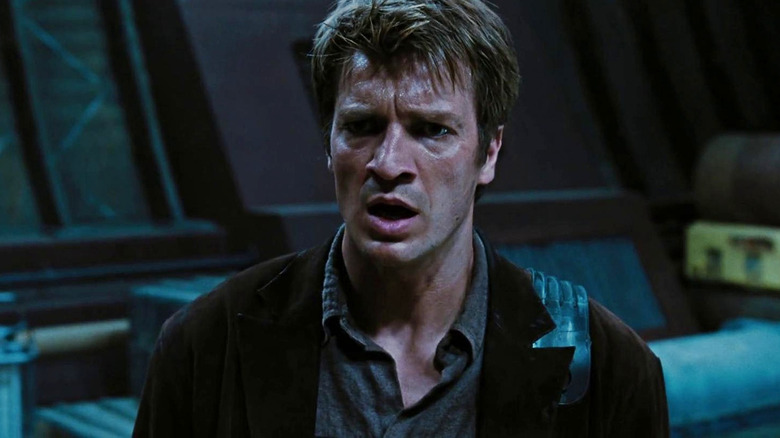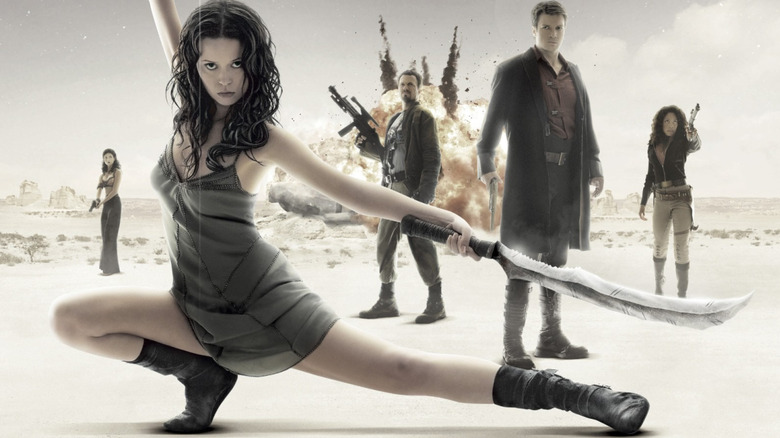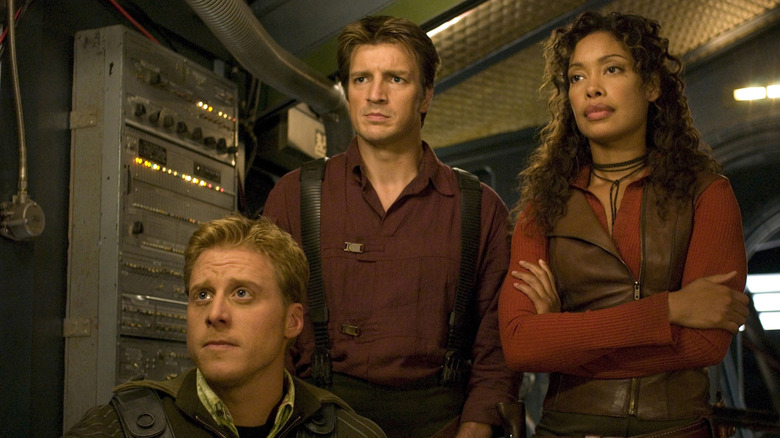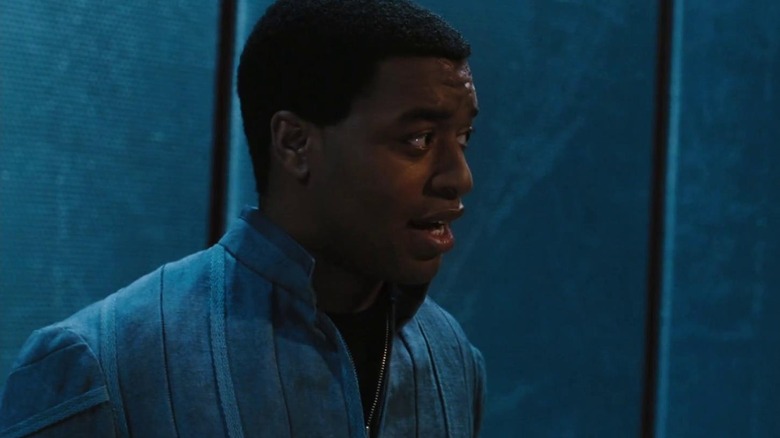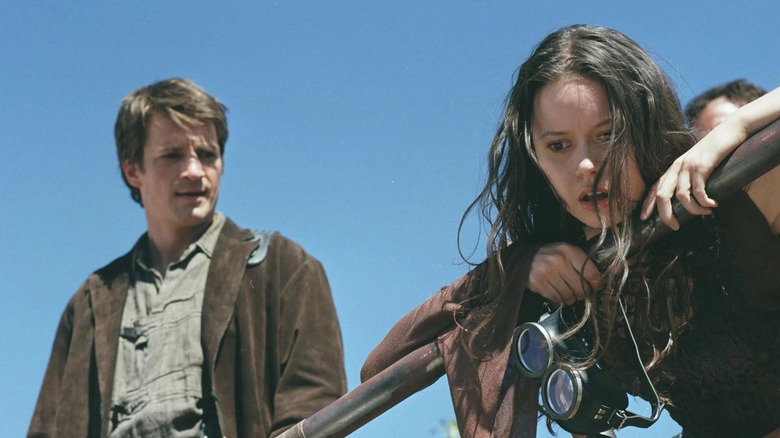20 Years Ago, A Cult Favorite Sci-Fi TV Show Became A Big Screen Box Office Bomb
(Welcome to Tales from the Box Office, our column that examines box office miracles, disasters, and everything in between, as well as what we can learn from them.)
"I felt not only this incredible loss, but that I had lied to the actors, that I had let them down, that I had told them, 'if it's good, and you're good, then everything will be fine.'" Those are the words of Joss Whedon speaking in 2013 about the cancellation of his much-beloved, short-lived sci-fi series, "Firefly."
Although it is now beloved and held up as a classic, "Firefly" lasted only a single season on Fox before it was canceled. Whedon, who had already made a big name for himself with genre fans in the TV space thanks to the success of "Buffy the Vampire Slayer" and "Angel," believed it could be a big hit. Eventually, he found a way to try to make it up to the cast by bringing the action from television to the big screen.
After being canceled in 2002, Universal Pictures saw an opportunity to capitalize on the audience Fox bailed out on by giving Whedon the chance to make a movie with these characters in this universe. It materialized in the form of 2005's "Serenity," a well-liked movie that very much satisfied its fans. The only problem? There weren't nearly enough fans at the time to turn it into a hit.
In this week's Tales from the Box Office, we're looking back at "Serenity" in honor of its 20th anniversary. We'll go over how it came to be, why Universal was very confident in it, what happened when it hit theaters, what happened in the aftermath of its release, and what we can learn from it two decades later. Let's dig in, shall we?
The movie: Serenity
The film centers on a group of rebels traveling the outskirts of space aboard their ship, the Serenity. After the crew takes in Simon (Sean Maher) and his psychic sister River (Summer Glau), they find themselves pursued by the Operative (Chiwetel Ejiofor), an agent of the Alliance, a sinister regime that controls most of the universe.
When "Firefly" ended unceremoniously on Fox, Whedon was arguably at the height of his powers in television, with "Buffy" wrapping up its seven-season run in 2003 and "Angel" still on the air through 2004. As a filmmaker, though, Whedon had yet to truly establish himself, even though he had written movies such as "Alien: Resurrection" and "Titan A.E.," in addition to uncredited work on movies like "Speed."
After failing to get "Firefly" picked up by another network, he set about trying to turn it into a feature film. In the book "Serenity: The Official Visual Companion," Whedon explained that Universal Pictures got what he wanted to do and backed his idea.
"Universal came in where I thought nobody else would, and quite frankly, I'm not sure anybody else would've, with absolute faith and has maintained it. It's been the easiest process in terms of dealing with a studio that I've ever had. And they turned it into — not a blockbuster, which is not what I was trying to make, but not a low-budget movie either. They wanted to make a real movie out of it. They wanted to give us the scope that the show could never have had. So all I had to do was come up with a story that was worth that."
Joss Whedon gets the chance to resurrect Firefly on the big screen
Nathan Fillon (Mal), Gina Torres (Zoe), Alan Tudyk (Wash), Morena Baccarin (Inara), Adam Baldwin (Jayne), and Jewel Staite (Kaylee), among others, all reprised their roles from the show. Whedon also added talent such as Chiwetel Ejiofor ("Love Actually") as the villain, the Operative.
Cast aside, the issues were apparent. Even though "Firefly" had a loyal audience, it was a single-season show that was canceled by Fox, largely due to its ratings. Whedon had to make this movie accessible to those who had never seen the show. As he put it in an April 2012 interview with /Film, it was "a bunch of characters who already know each other and are established, but have to be introduced to new people."
While Universal saw the potential in "Serenity," they still attempted to be reasonable, giving Whedon a $39 million budget to work with. That meant having to make the most of every dollar. "I shot my own second unit on 'Serenity,'" the director explained in that same 2012 /Film interview.
Before proceeding, we should acknowledge that this was long before Whedon was accused of abusive on-set behavior during "Justice League," in addition to other allegations of wrongdoing by the filmmaker. At the time, he was viewed as one of the most promising voices in the nerd community. That's precisely why Universal was bullish on the film, even if that proved to be the project's undoing.
The hype for Serenity was through the roof - or so it seemed
Even though the internet wasn't as powerful in 2005 as it is now, Hollywood was still susceptible to the noise it made. That's why Universal picked up "Serenity." The problem is that, especially then, it was a loud minority of the potential audience that could make something seem bigger than it really is. Especially when the project at hand relies on people leaving the house and paying hard-earned folding money to see it.
Mind you, this was the same year that "Batman Begins" came out, and just a couple of years after "Spider-Man 2" and "X2." The nerds were winning, and studios could see that. So, Universal poured a lot into Whedon's vision, including a big showing at San Diego Comic-Con the summer before its release.
"As the crew of the Serenity strode out onto the stage, the faithful gathered in Ballroom 20 knocked the decibel level up several deafening notches. This was *the* entrance of the Convention. Nearly the entire room leapt to its feet," wrote Ain't It Cool News in July 2004 of the reception to "Serenity" at SDCC that year.
Universal also held quite a few fan screenings in the lead-up to the release, so much so that nitty, gritty details of the plot wound up online long before it hit theaters. But the response was overwhelmingly positive. Ain't It Cool News published a round-up of fan reviews in June 2005, including reactions such as, "Bottom line: If you enjoy smart science-fiction, you'll like this movie," and "I honestly believe 'Serenity' is one of the coolest movies I've seen."
The financial journey
Given the response, Universal has reason to be confident. To that end, Whedon's feature directorial debut did score very well, boasting an 87% critical approval rating on Rotten Tomatoes, to go with a stellar 91% audience score. Unfortunately, the audience for such a thing, in theaters anyway, was still limited.
"Serenity" hit theaters on the weekend of September 30, 2005. That also happened to coincide with the disaster that was Hurricane Katrina, which made moviegoing either not possible or not a priority for a large chunk of the U.S. That didn't help. Even so, on a not-at-all-crowded weekend, the film only managed to pull in $10 million in its debut, with Jodie Foster's thriller "Flightplan" ($14.8 million) taking the crown again on its second weekend. The other new releases that weekend were the Paul Walker vehicle "Into the Blue" ($7 million) and "The Greatest Game Ever Played" ($3.6 million).
Things didn't improve in the coming weeks, with the film falling out of the top ten entirely by its third weekend when the much-maligned remake of John Carpenter's "The Fog" debuted at number one with $11.7 million. Even against weak competition, the fate of Whedon's passion project was sealed.
"Serenity" finished its theatrical run with $25.5 million domestically to go with $14.9 million internationally for a grand total of $40.4 million worldwide. That scarcely matched the production budget, not accounting for marketing expenses. Once theaters took their cut of the ticket sales, Universal was left in the red.
Serenity helped keep the Firefly universe alive
What's interesting is that, for a moment, Universal seemed interested in keeping the franchise going. "You know those little animated features like 'Animatrix' and the one for 'Chronicles of Riddick?' They wanted to do one of those for 'Serenity,'" Dark Horse's Scott Allie revealed to Sequential Tart in 2015. Eventually, those stories were used to fuel a series of "Serenity" comic books published by Dark Horse.
Even after the movie's failure, virtually unending demand for some sort of "Firefly" revival persisted, with Fillion and the rest of the cast constantly fielding questions about it. The franchise has been kept alive with books, collectibles, and even video games, but the days of a possible relaunch are long gone. If nothing else, Whedon's movie helped offer some sort of closure to fans of the show.
Whedon, meanwhile, went on to become a hugely successful director for a time, helming Marvel's "The Avengers" to $1.5 billion worldwide in 2012, redefining blockbusters for years to come. He also directed "Avengers: Age of Ultron" in addition to taking over duties on "Justice League" after Zack Snyder and Warner Bros. parted ways. Shortly thereafter, the accusations against Whedon all but killed his Hollywood career. He's done little in the years since, yet the "Firefly" faithful remain.
The lessons contained within
This situation almost served as a cautionary tale to Hollywood in the age of fandoms driving entertainment. Shows that are canceled before their first season even finishes are rarely seen as a gold mine. Yet, the loudness of those fans, coupled with Whedon's popularity in those circles, led Universal to believe "Serenity" would be a good investment.
It may have been wrongheaded, but they wisely kept the budget reasonable enough so that the losses weren't horrific. Still, they came to understand that online chatter and what gets buzz at Comic-Con doesn't always equal real-world interest. Universal would learn this lesson again with "Scott Pilgrim vs. the World" in 2010.
It's also interesting that Whedon became embroiled in the "Justice League" debacle, with Warner Bros. eventually giving Snyder a lot of money to finish his version of the movie, dubbed Zack Snyder's "Justice League," released on HBO Max in 2021. It's hard to imagine anyone at Warner Bros. would consider that a worthwhile investment in the here and now. Whedon, somehow, found himself on the wrong end of that one as well.
What stands out more than anything is Fox's decision to cancel "Firefly" so early on. At the time, the ratings weren't what the network wanted, but it's remarkable how long the show has endured. It became a hit all over again on Disney+ recently. How many one-season sci-fi shows can say that? Sometimes, letting something find its audience can be a worthwhile investment. But that audience was always going to be in the realm of TV. As it existed, a movie without "Firefly" in the title never made much sense.
Maybe if Fox had let the show ride for a while, a movie would have made sense down the line after a well-earned series finale. That's not the way it shook out.
